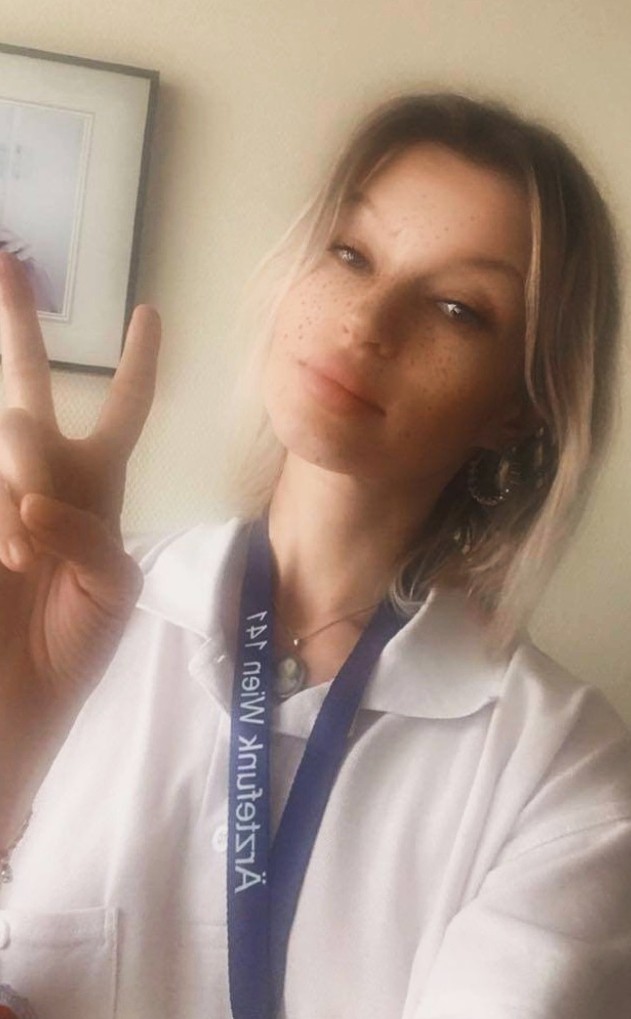Martina Bjanov was never able to make her dream of acting come true but life offered a bigger stage – a stage with true life heroes, whose stories, regrettably, do not always have a happy ending.
Having overcome the coronavirus, she is back on the front line where she spares no effort to help others. Martina works as a nurse in Vienna, in one of the special pavilions every hospital has which are the first stopover for patients. At her workplace she wears special protective clothing but even that was unable to protect her from Covid-19.
Fortunately, she spent the 14-day quarantine period without any symptoms. And while she was at home she followed everything happening in Bulgaria.
“The equipment and the facilities in Austria are very good,” Martina says. “But the Bulgarian medical staff is definitely more capable. Bulgarians are accustomed to stress and the working conditions – I mean the equipment, the rapid reaction instruments, even the ambulances, there is no comparison. If I were to be in a Bulgarian ambulance with an Austrian medical worker, I am not sure he or she would be able to cope. We tend to be more creative.”
 Martina says that in Austria only people with symptoms are tested, and that to this moment around 200,000 tests have been carried out. The peak of the infection has already passed, that is why as of 1 May the government will ease the measures – the big stores, schools and restaurants will open doors. In her words, people comply with the restrictions imposed, wear masks and are happy to be able to go out of doors. And though opposition parties are accusing chancellor Sebastian Kurz of fear-mongering in connection with the coronavirus, Martina is categorical that she has never heard the authorities talk about all hell breaking loose, or about body bags, the terminology used in Bulgaria.
Martina says that in Austria only people with symptoms are tested, and that to this moment around 200,000 tests have been carried out. The peak of the infection has already passed, that is why as of 1 May the government will ease the measures – the big stores, schools and restaurants will open doors. In her words, people comply with the restrictions imposed, wear masks and are happy to be able to go out of doors. And though opposition parties are accusing chancellor Sebastian Kurz of fear-mongering in connection with the coronavirus, Martina is categorical that she has never heard the authorities talk about all hell breaking loose, or about body bags, the terminology used in Bulgaria.
While she was still at school Martina attended director Nikolay Georgiev’s experimental drama school “4хС”, and dreamed of the stage but a German language summer course in Austria turned her life around. When she was at university she met her future husband – a paramedic – and later enrolled in the nursing school. Now she works with people with severe physical and mental disabilities, takes shifts at the pavilion in front of Rudolfstiftung Clinic Vienna, goes on call with ambulances.
“It used to make me feel bad, I even wanted to apply to a drama school here,” Martina Bjanov says. “But the moment I entered the hospital and started work with the patients I stopped regretting anything and this is the sphere I still want to develop in. Obviously years ago was the time for that dream of mine, now is the time for something different. Now my dream is to join Doctors without Borders, I just want my daughter to get a little bit older. I have already applied and I am waiting to see if I have been approved and can take on some mission.”
And while she is waiting for the time to come for her new dream, she watches people as they change, for good or evil, and says she believes that when this calamity is over we shall have learnt the lessons of life.
“There are people who are totally selfish – I am healthy, I have food and nothing else matters,” Martina Bjanov says. “But most people would willingly go and do an elderly person’s shopping or call an ambulance if they see someone in the street who is not feeling well. We now seem to take more care of one another, especially young people. I have interns who ask me if they can be late because, together with friends, they want to take food round to the older people from their neighbourhood. And I say – of course you can, that is very important. Things are going better now, and even nature is less troubled.”
Photos: private library
Exactly a month after the Bulgarian National Radio solemnly celebrated its 90th anniversary, history continues its dialogue with us, its authors. With a special event on February 25, the exhibition "90 Years of the Bulgarian National Radio - The Radio..
Exactly 3 years ago, on February 24, Russia’s invasion of Ukraine began – an event that woke up Europe 77 years after the end of World War II and called into question one of the main goals of the EU – preventing a new armed conflict on the continent...
The festive service for the consecration of the new Bulgarian Orthodox church in London is led by His Holiness Daniil , Patriarch of Bulgaria, who also officiated at the Ressurection Vespers on Saturday. Hundreds of lay people-official guests and..
Exactly a month after the Bulgarian National Radio solemnly celebrated its 90th anniversary, history continues its dialogue with us, its authors. With a..

+359 2 9336 661
